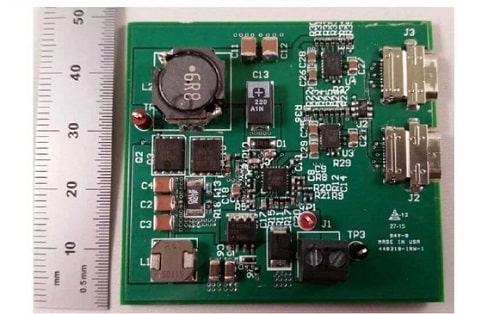This reference design takes an automotive input voltage of 12V and can charge two devices simultaneously with a total current of up to 4.5A. The design is fully compliant with USB type C and backward compliant with BC1.2 and DCP configurations.

With smartphones getting more powerful, and the profile and thickness of the devices getting slimmer, it is difficult for most users to complete a day without topping up the battery. Thus, it is essential to have a charger in vehicles. Today, most smartphone manufacturers are opting for Type-C chargers. Thus, it is essential to add Type-C charging port in the vehicles that can directly be connected to the 12V automotive battery and use to charge the user’s smartphone through the Type-C port. So to simplify adding Type-C charging port, Texas Instruments (TI) have added a new reference design.
PMP11114 is a reference design for an Automotive Input Dual Port USB Type-C Charger. This design is meant to demonstrate how to implement a dual-port USB Type-C charger in an automotive setting, providing charging capabilities for two devices at once. The reference design from Texas Instruments provides a complete and tested solution for customers who are looking to develop similar products and includes the schematic, bill of materials, and layout files, as well as firmware and software resources.
The reference design is capable of detecting if the connector is connected or not. It is also capable of audio and debugs accessory identification. It has a port power management that enables power resources optimization across multi-port. The images below show the thermal performance of the design. Different-sized and shaped boards will perform differently. The module works best at a lower voltage, it has higher efficiency and lower heat loss.
The PMP11114 USB Type-C reference design employs TPS25810 as the main charging IC. It is a highly integrated USB Type-C Downstream Facing Port (DFP) controller with a built-in power switch developed for the new USB Type-C connector and cable. The part provides all functionality needed to support a USB Type C DFP in a system where USB power delivery (PD) source capabilities.
USB Type-C removes the need for different plug and receptacle types for host and device functionality. The Type-C receptacle replaces both Type-A and Type-B receptacles since the Type-C cable is plug-able in either direction between the host and the device. The USB Type-C ports can operate in one of three data modes including host mode, device mode and dual-role mode. In the host mode, the port can only be a host i.e. it can provide only power. In the device mode, the port can only be a device and work as a consumer of power and in the dual-role mode where the port can be either host or device Port type.
Features of PMP11114 USB Type-C reference design:
• Connector Attach/Detach Detection
• STD/1.5-A/3-A Capability Advertisement on CC
• Audio and Debug Accessory Identification
• Power Wake Supports Low Power in System
Hibernate (S4) and OFF (S5) Power States
• 34-mΩ (typ) High-Side MOSFET
• 1.7/3.4-A ILimit (±7.1%) – Programmable
• Port Power Management Enables Power
Resource Optimization Across Multi-Ports
TI has tested this reference design. The company has also provided additional resources such as schematics, Gerber files, etc. You can find additional data about the reference design on the company’s website. To read more about this reference design click here.








